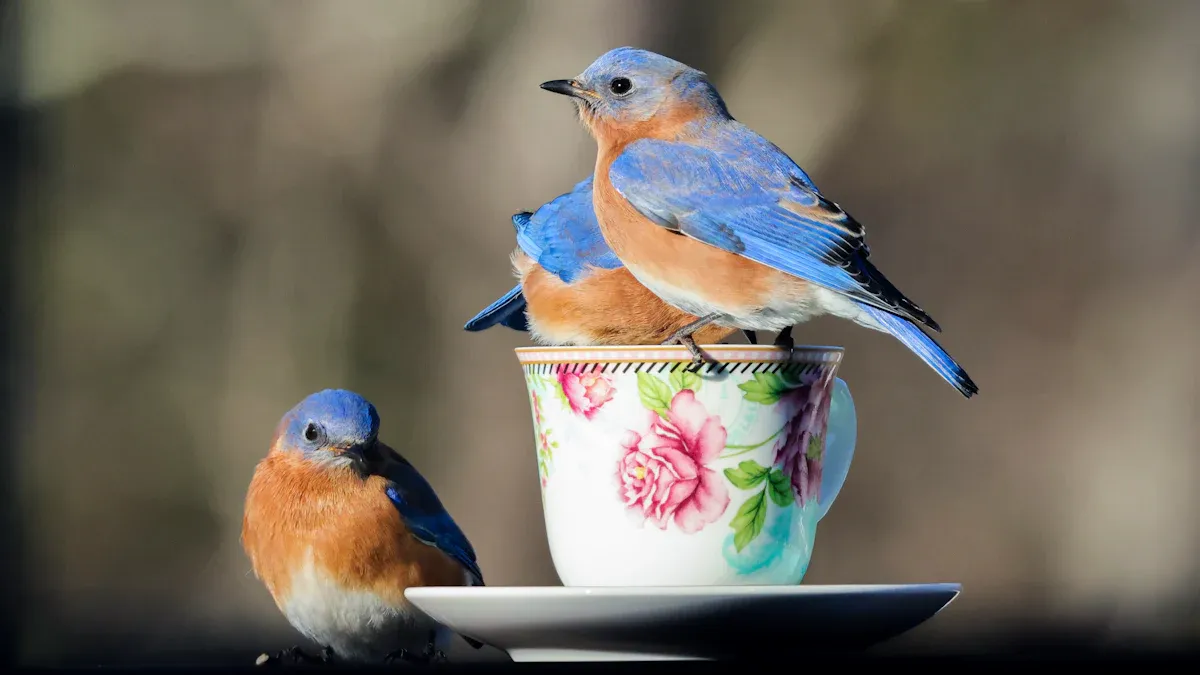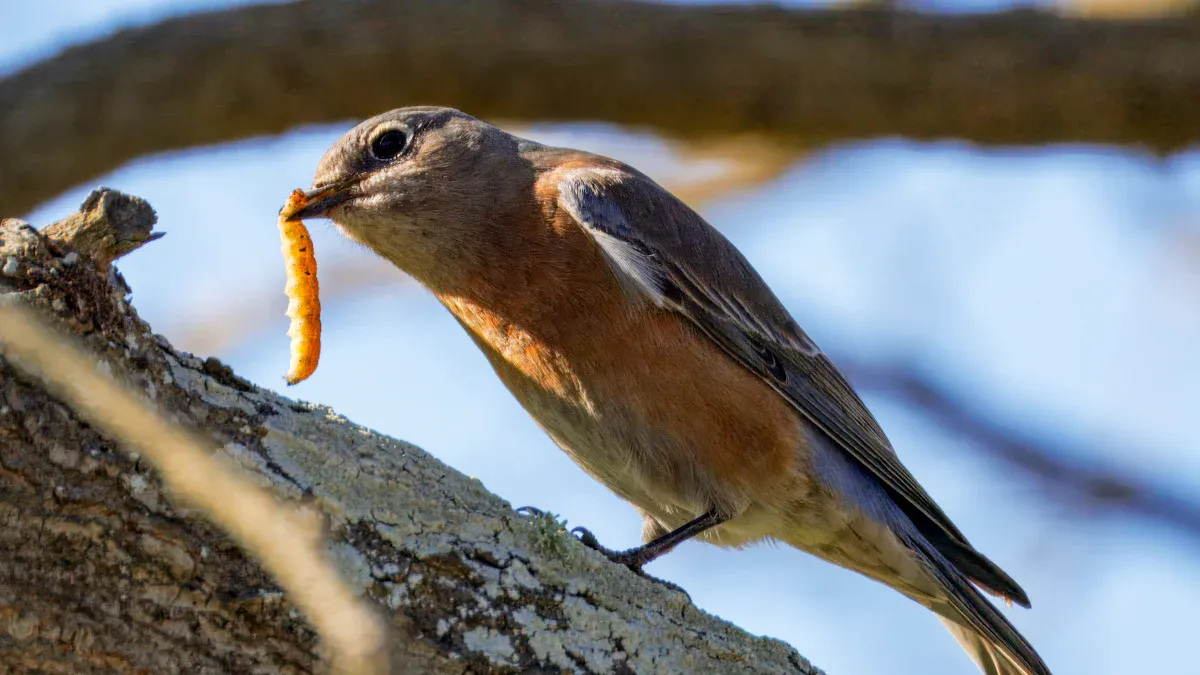
Feeding mealworms to bluebirds offers a simple way to boost their health. These protein-packed insects mimic the natural diet of bluebirds, helping them thrive. Research from Minnesota shows that bluebirds eating mealworms had stronger immune responses to blow flies. Choosing high-quality mealworms ensures they’re safe and nutritious, keeping your feathered friends happy.
Key Takeaways
- Giving mealworms helps bluebirds stay healthy. They provide protein, calcium, and fiber for energy, hydration, and strong bones.
- Pick good-quality mealworms from trusted sellers to keep birds safe. Check for freshness, fair sourcing, and good customer feedback.
- Dried mealworms are easy to use for feeding bluebirds. They last a long time and are simple to store, making feeding easier and better.
Benefits of Feeding Mealworms to Bluebirds
Nutritional Value of Mealworms
Mealworms are packed with essential nutrients that bluebirds need to thrive. They contain high levels of protein and fat, which provide energy during demanding periods like migration and nesting. Calcium in mealworms supports strong eggshells, while fiber aids digestion. Their moisture content, over 61%, also helps keep bluebirds hydrated, especially in hot weather. Compared to seeds, mealworms offer a more balanced diet, making them an excellent choice for bluebird enthusiasts.
Did you know? Feeding mealworms to bluebirds can help them recover from energy loss during nesting. Studies show that mealworms improve hydration and digestion, ensuring bluebirds stay healthy and active.
Role in Supporting Bluebird Health and Breeding
Mealworms play a vital role in bluebird health and reproduction. Research highlights their ability to boost resistance to parasites like blow flies, which often harm nestlings. Bluebirds supplemented with mealworms also show higher fledging success rates. Additionally, food supplementation positively impacts nesting success, increasing the number of eggs laid and hatched. By offering mealworms, bird lovers can directly support bluebird populations and their long-term survival.
| Evidence Type | Findings |
|---|---|
| Nesting Success | Food supplementation increases eggs laid, hatched, and fledglings. |
| Parasite Interaction | Mealworms help mitigate the effects of parasitic nest flies. |
| Health Improvement | Bluebirds fed mealworms show higher resistance to parasites. |
Why Dried Mealworms Are a Convenient Choice
Dried mealworms offer a hassle-free way to feed bluebirds. They don’t require refrigeration and have a long shelf life, making them perfect for busy bird enthusiasts. Unlike live mealworms, dried ones are easy to store and handle. They’re also lightweight, so they’re ideal for filling feeders or mixing with other bird foods. Feeding mealworms to bluebirds becomes simpler with dried options, ensuring these feathered friends get the nutrition they need without added effort.
How to Choose the Right Mealworm Supplier
Ensuring Quality and Freshness
High-quality mealworms are essential for keeping bluebirds healthy. A reliable supplier ensures their mealworms are fresh, free from mold, and stored properly. Fresh mealworms should have a natural color and smell. Dried mealworms, on the other hand, should feel crisp and not appear shriveled or discolored. Checking the packaging date and storage conditions can help confirm freshness. Suppliers who prioritize quality often provide detailed product descriptions and are transparent about their handling processes.
Tip: Look for suppliers who offer guarantees on freshness. This shows they stand behind their product and care about your bluebirds’ well-being.
Ethical Sourcing and Sustainability
Ethical sourcing matters when choosing a mealworm supplier. Suppliers who follow sustainable practices ensure their mealworms are raised in clean, humane environments. This not only benefits the birds but also supports eco-friendly farming. Ethical suppliers often avoid harmful chemicals or additives during production. Look for companies that highlight their commitment to sustainability on their websites or packaging. Supporting these businesses helps protect the environment while providing safe food for bluebirds.
Evaluating Nutritional Content and Additives
Not all mealworms are created equal. The best suppliers provide mealworms rich in essential nutrients like protein, fat, and fiber. These nutrients support digestion, hydration, and overall health in bluebirds. Some suppliers may add calcium to their mealworms, which is especially beneficial for breeding birds. Avoid products with artificial additives or preservatives.
- Mealworms naturally contain:
- Over 61% moisture for hydration.
- High protein and fat for energy.
- Fiber to aid digestion in young bluebirds.
Reading the nutritional label can help ensure you’re offering the best to your feathered friends.
Identifying Reputable Suppliers (Certifications and Reviews)
Reputable suppliers often have certifications that guarantee the quality and safety of their products. Look for certifications related to food safety or organic farming. Customer reviews are another great way to evaluate a supplier. Positive reviews often highlight consistent quality, reliable shipping, and excellent customer service. Suppliers with a strong reputation are more likely to provide mealworms that meet your expectations.
Note: A quick online search can reveal a lot about a supplier’s reputation. Trustworthy companies usually have detailed websites and active customer support.
Risks of Poor-Quality Mealworms

Health Issues Caused by Low-Quality Mealworms
Feeding mealworms to bluebirds can be beneficial, but poor-quality mealworms may harm their health. Mealworms that lack proper nutrition can lead to serious issues. For example, they may deplete calcium in bluebirds, causing weak bones in young birds. Laying females may also suffer from egg binding, a condition where eggs cannot pass properly. Additionally, contaminated mealworms can introduce harmful bacteria or parasites, putting bluebirds at risk of illness. These risks highlight the importance of choosing high-quality mealworms to keep bluebirds safe and healthy.
Signs of Poor-Quality Mealworms
Spotting low-quality mealworms is easier when you know what to look for. Live mealworms should appear active and have a natural, golden-brown color. Dried mealworms should feel crisp, not shriveled or discolored. A musty smell or visible mold are clear signs of contamination. Packaging that lacks clear labeling or nutritional information can also indicate a subpar product. Paying attention to these details helps ensure the mealworms you provide are safe for bluebirds.
Tips for Avoiding Contaminated or Unsafe Mealworms
Avoiding unsafe mealworms starts with choosing a reputable supplier. Look for companies that prioritize quality control and ethical sourcing. Check reviews from other bird enthusiasts to confirm the supplier’s reliability. Always inspect the mealworms upon arrival for freshness and proper storage. Storing mealworms in a cool, dry place can also prevent spoilage. By taking these steps, you can confidently provide bluebirds with a nutritious and safe food source.
Feeding mealworms to bluebirds ensures they stay healthy and active. High-quality mealworms provide essential nutrients like protein, calcium, and fiber. They’re easy to digest and help young birds grow strong. Choosing ethical suppliers supports sustainability and bird health. Investing in premium mealworms helps protect bluebird populations while creating a thriving backyard habitat.
🐦 Tip: Prioritize quality and sustainability when selecting mealworms to keep your feathered friends safe and happy!
FAQ
What is the best way to store mealworms?
Store dried mealworms in a cool, dry place. Use an airtight container to keep them fresh. For live mealworms, refrigeration slows their activity and extends their lifespan.
🐦 Tip: Always check for mold or unusual smells before feeding mealworms to bluebirds.
How many mealworms should I feed bluebirds daily?
Offer 10-15 mealworms per bird daily. Adjust based on the number of visitors and their activity. Avoid overfeeding to ensure a balanced diet.
Can I mix mealworms with other bird foods?
Yes! Combine mealworms with seeds, fruits, or suet for variety. This mix attracts more birds and provides a well-rounded diet for your feathered friends.
Note: Mixing foods can make feeders more appealing to bluebirds and other species.


